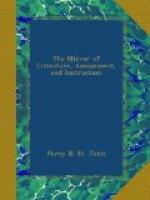“It was also by the same act further enacted, that at every such race, for a plate or prize of the value of 50l. and upwards, each horse, if five years old, should carry ten stone; if six years old, eleven stone; and if seven years old, twelve stone. And that the owner of any horse, carrying less than the specified weight, should forfeit his horse, and pay the penalty of 200l.”
(TO BE CONCLUDED IN OUR NEXT.)
* * * * *
THE SELECTOR; AND LITERARY NOTICES OF NEW WORKS.
* * * * *
THE FAIR OF MAY FAIR.
The volumes of sketches of fashionable life with this quaint title will serve to amuse a few inveterate novel-readers; while occasional pages may induce others to take up the thread of the narrative. The flying follies of high life, or rather, we think, of affected ton, are hit off with truth and vigour, and there is a pleasantry in the writer’s style which is an acceptable relief to the dulness of common-place details. We shall endeavour to detach a scene or two, one, as a specimen of “the art of ingeniously tormenting,” and the incipient waywardness of a newly-married pair.
“From the first months of his domestication with his wife at Wellwood Abbey, Sir Henry Wellwood had intended, had longed, to commence his little system of tender remonstrance; but the slightest insinuation of a difference of opinion was sufficient to fan the embers of Henrietta’s distemperature into a conflagration. The blaze was not strong, indeed; for the lady had always been accustomed to find a fit of wilfulness, or of affected despondency, more available and becoming than one of hasty anger. But she was tolerably expert in those piquant flippancies of speech which harass the enemy like a straggling fire; and could contrive, when it suited her purpose, to make herself as disagreeable as if her face had not been that of a cherub, or her voice seraphic.
“‘A woman,’ quoth La Bruyere, ’must be charming indeed, whose husband does not repent, ten times a day, that he is a married man.’ Sir Henry Wellwood would have scoffed at the axiom. The ‘idol of his soul’ was still an idol; although, like the votaries of old, he had managed to discover that it was not wholly formed of precious metals; that its feet were of clay! He still fancied himself the happiest of mortals; particularly when Henrietta, in her best looks and spirits, was riding by his side through the Wellwood plantations, listening to the project of his intended improvements;—or seated in her boudoir sketching designs and modelling plans for his two new lodges. Sometimes after dinner she would busy herself with her guitar, and insist on his attempting a second to her Italian notturno; sometimes she persuaded him to lend her his arm towards the village, to assist in executing that easy work of benevolence, the deplenishment of her silken purse. At such, moments she was indeed enchanting;—and the fascinated Wellwood was quite willing to echo the chorus of Mrs. Delafield’s visiters, that he had ‘drawn a prize.’




